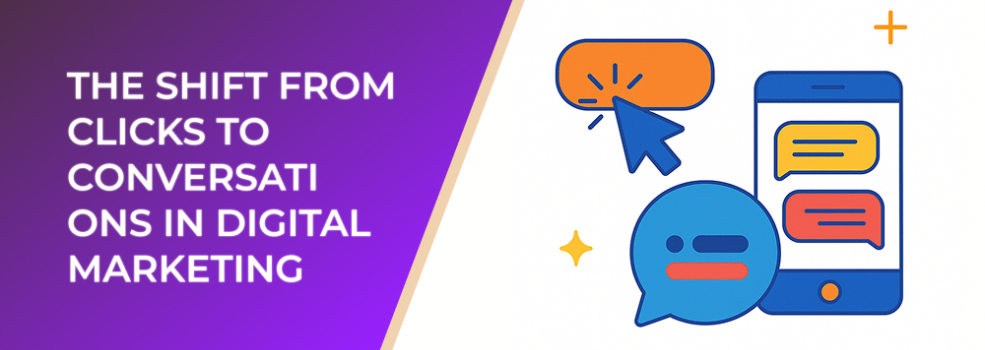Digital marketing is undergoing a structural shift. For years, clicks were the dominant metric for measuring campaign effectiveness. But as customer expectations evolve and privacy limitations reduce surface-level engagement tracking, brands are turning to conversational interactions to understand, qualify, and convert their audiences.
Today, conversations—not clicks—are becoming the most reliable indicator of real intent.
Why Clicks Are Losing Their Power
Clicks once served as a clear signal of interest. But the digital environment has changed.
Industry analysis shows that nearly 56% of ad clicks are accidental, unintentional, or low-intent, drastically reducing the reliability of click-based metrics.
Meanwhile, platform-reported click-through rates have plateaued across most industries. This flattening means clicks reveal less about a user’s likelihood to convert.
Conversations Create Clearer Insight Into Intent
With more brands incorporating messaging tools, conversational funnels reveal what clicks cannot: context.
Brands shifting to conversational engagement report:
-
35–50% higher qualified lead rates
-
More accurate segmentation based on real user language
-
Stronger long-term customer value
Conversations allow marketers to identify pain points, clarify offers, and guide users, replacing assumptions with direct insights.
Messaging as a Primary Touchpoint
Messaging-based interactions on platforms continue to rise.
A 2025 usage study found:
-
Over 3 billion people use messaging apps monthly
-
More than 70% of consumers prefer chatting with businesses over filling forms
This shift places messaging at the center of modern marketing funnels.
Conversations Improve Conversion Rates
Direct chat interactions significantly outperform static landing pages.
Across multiple sectors, brands implementing conversational flows reported:
-
18–32% higher conversion rates compared to click-to-website funnels
-
Faster qualification and reduced drop-offs
By reducing friction and enabling real-time clarification, conversations accelerate buying decisions.
The Role of AI-Assisted Assistants
As conversational volume grows, intelligent assistants enable scalable, always-on dialogue.
Automated conversation frameworks support:
-
Lead qualification
-
Product discovery
-
FAQ responses
-
Personalized recommendations
Studies show that companies integrating structured AI-assisted chat experiences see up to 40% faster response times and improved customer satisfaction.
Measuring Conversation Quality
Since clicks no longer dictate success, marketers are adopting new metrics:
-
Response rates
-
Conversation depth
-
Sentiment indicators
-
Qualification scores
-
Time-to-conversion insights
These metrics provide a more complete view of user engagement and decision-making behavior.
Conversations Support Privacy-First Advertising
Conversational engagement naturally aligns with privacy-first marketing.
Instead of relying on intrusive tracking, insights flow directly from users.
Brands using conversational feedback loops report:
-
20–28% stronger model training data for ad platforms
-
More reliable audience signals without violating privacy standards
Final Thoughts
The industry is moving toward a new era where genuine interactions matter more than surface-level engagement. Conversations offer richer insights, stronger qualification, and higher conversion potential. Marketers who embrace this shift will build more resilient and trustworthy digital ecosystems.

